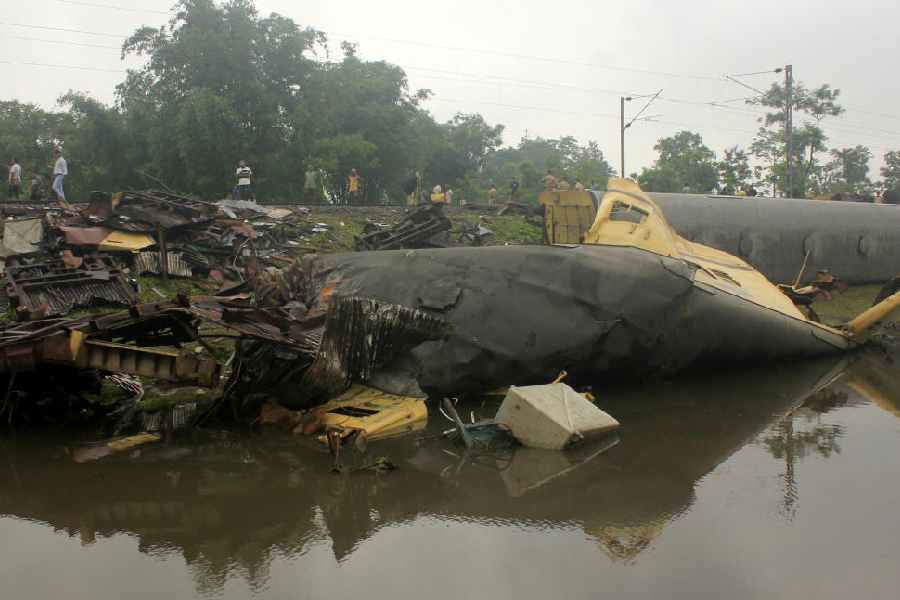Misshapen iron and steel shapes stick out ominously amid the lush green landscape of tea plantations and farms at Chhoto Nirmaljote.
Two giant coaches lie beside the tracks. Mangled remains of the third coach lie on the other side of the tracks, along with loose axles and numerous nameless remains, bearing testimony to the devastating collision of the Kanchenjunga Express and a freight train near Rangapani station of Darjeeling district on Monday morning which has claimed 10 lives so far.
Some 40 men in khakis, half wearing fluorescent jackets, stand in lines, just off the tracks. Another man in fatigues stands in the middle.
“How is the josh?” the man asks, “High, sir!” a chorus replies. “I say, how is the josh?” the man asks again. “High, sir!” the chorus chants.
The men in khakis leave. The man in fatigues goes to a temporary tent.
“For over 24 hours now, our men are guarding the site. We have rescued 54 people and found nine bodies. That is why, I felt it necessary to encourage them,” says Kamal Singh, a commandant in the Railway Protection Force (RPF), when asks about his "verbal tonic".
Rafikul Mohammad, a resident of Chhoto Nirmaljote stands near the tracks.
“I spent a sleepless night on Monday. I'd never seen so much blood before,” says Rafikul, a rickshaw van puller in his 50s.
On Monday, Rafikul reached home from the local mosque after the Eid al-Adha namaz when he heard the sound of crashing metal.
“I was just about to eat but ran out. What I saw took away my breath. A coach was hanging on the loco of another train. What I heard were screams of hundreds of people in different languages. I had to help,” he said.
Rafikul ran back home and brought out his rickshaw van.
“The railway track is not accessible to four-wheelers. I asked others to put the injured people in my van and I took them to the nearest village road 1.5km away so that they could find help faster,” he added.
Many passengers offered him money, he says. “I refused. I felt it would be wrong,” he says.
Unlike Monday, when hundreds swarmed to the accident site, there are not too many people on Tuesday. Shital Das of Chopra, around 25km away from the site, and his friends click photos. RPF personnel asks them to stay away from the tracks.
“We didn't know the damage was so extensive. One of the coaches has simply become shapeless metal,” said Das.
Security men patroll the area. Some villagers come and go. Some workers assemble cables and smaller parts of the wreckage.
Railway officials, seated inside the tent, speak in low voices.
Suddenly, the whistle of a train alerts everyone. The RPF men ask people to vacate tracks. Railway officials stand, watchful.
As the train approaches the site at a snail's pace, curious passengers from almost every door of every coach vie to see the wreckage. Many click photos, shoot videos.
“The wreckage has become an attraction,” Sheikh Akhtar, a villager, shakes his head.
Dusk falls. The patrolling of guards continues. A mini generator burrs to life. Onlookers like Das leave for their homes. Trains continue to pass, slowly, with curious faces peering out.










